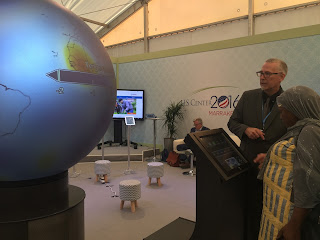The United States at COP23: What to expect?
 |
| US Center at COP22 Marrakech in 2016 featuring one of NASA's climate modeling education tools |
It has often been complicated to be a US citizen at the UN Climate Change Conferences. The US is responsible for vast historic emissions of greenhouse gases and continues to be one of the leading emitters in the world. Compounding this, the US has not always been interested in stepping up as a leader to curb emissions or chart a new path forward for development. For example, the US never ratified the Kyoto Protocol which is the first agreement established under this UN climate framework to reduce global greenhouse gas emissions.
 |
| Jonathan Purshing, long time US climate negotiator, introduces Sec. John Kerry at COP22 in 2016 |
I anticipate that this year will present an even great challenge being a US researcher and observer at the COP. While we certainly do not represent the US government in any capacity, we unavoidably represent our country as citizen of the US. And tough questions will be asked, and they should be answered.
Right now, we do not know how the official position of the US will play out. We know that Trump has announced that he is pulling the US out of the Paris Agreement, but under the provisions of the Agreement this process will take a minimum of three years. We also know that the US government sent a 7 person delegation to the inter-sessional climate change meeting in May which represents a fraction of the normal delegation size. Since so many meetings occur at the same time, a small delegation prevents a country from fully participating in the proceedings of the negotiations. Historically, the US has also presented its efforts on climate change--especially projects coming out of NASA and USAID--at the US pavilion inside the COP. Many countries have a space like this to share what they are doing on climate change and to provide a meeting and networking space. It is expected that the US will not have a pavilion this year, thus not running any US government open programming at all.
 However, sub-national entities have coordinated ahead of the COP to host a US Climate Action Center to fill this void, and express to the world that sub-national actors are still committed to the climate change negotiating process and the Paris Agreement. The Center is run by the We Are Still In coalition and has events scheduled throughout the two week conference. It is situated right outside of the UN zone of the conference which will allow both delegates and the public to attend the events. I am looking forward to seeing what shape this takes, and learning what specific actions this group is able to achieve even without the support of the federal government. Specifically, I am planning to follow to what extent US states, like California and New York, start to play a role in the actual negotiating process while holding a starkly different position from the US federal government.
However, sub-national entities have coordinated ahead of the COP to host a US Climate Action Center to fill this void, and express to the world that sub-national actors are still committed to the climate change negotiating process and the Paris Agreement. The Center is run by the We Are Still In coalition and has events scheduled throughout the two week conference. It is situated right outside of the UN zone of the conference which will allow both delegates and the public to attend the events. I am looking forward to seeing what shape this takes, and learning what specific actions this group is able to achieve even without the support of the federal government. Specifically, I am planning to follow to what extent US states, like California and New York, start to play a role in the actual negotiating process while holding a starkly different position from the US federal government.Last year, when Trump was elected while COP22 was taking place in Morocco, countries signaled that they would double down on their commitments to the Paris Agreement and move forward without the US. This year, we will see to what extent countries act on these commitments. A major question is, will countries be able to move forward with substantive conversation despite rhetoric coming from Washington? This remains to be seen in the coming weeks.
Keep posted to hear about how the US role at COP23 unfolds alongside the roles of these sub-national entities and the positions of other countries in relation to the US.


Comments
Post a Comment